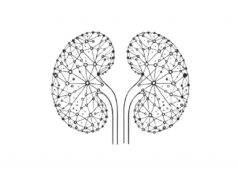At the recent Vascular Access Society of Britain and Ireland (VASBI) annual scientific meeting (26–27 September, Cardiff, UK), presentations on vascular access, the use of artificial intelligence (AI), the impact of socioeconomic factors, and much more led to in-depth discussions across the multidisciplinary audience.
Jeremy Crane (London, UK), incoming president of VASBI who followed on from past president Robert Jones (Birmingham, UK), shared his thoughts on this year’s meeting, stating: “This VASBI meeting has been excellent. It’s been the right mix of the multidisciplinary team that evolves around vascular access. It’s been the right amount of personnel, nurses, interventional radiologists, surgeons, nephrologists. There’s been a real sense of community here, and I think that’s been conducive to fantastic learning opportunities and discussions.”
The annual scientific meeting also featured several awards; Charmaine Lok (Toronto, Canada)—who gave this year’s Ali Bakran guest lecture on her work on the Kidney Disease Outcomes Quality Initiative (KDOQI) guidelines—was the recipient of the 2024 VASBI gold medal, whilst Michael Corr (Belfast, UK) and Robert Shahverdyan (Hamburg, Germany) received the first and second abstract prizes respectively, Corr’s for his presentation “Does socioeconomic deprivation impact vascular access in patients with end-stage kidney disease?”, and Shahverdyan for his discussion entitled “The Hamburg Experience with ultrasound-guided FLEX Vessel Preparation [VentureMed] and balloon-angioplasty of haemodialysis access”.
There were also discussions regarding the place of AI in vascular access research, with a presentation given by Nicholas Inston (Birmingham, UK), and Kate Steiner (Stevenage, UK) and Jen Hanko (Belfast, UK) hosted the first Grand VASBI Multidisciplinary Team (MDT) meeting, alongside several abstract presentations, including two from John Aruny (Orangeburg, USA).










